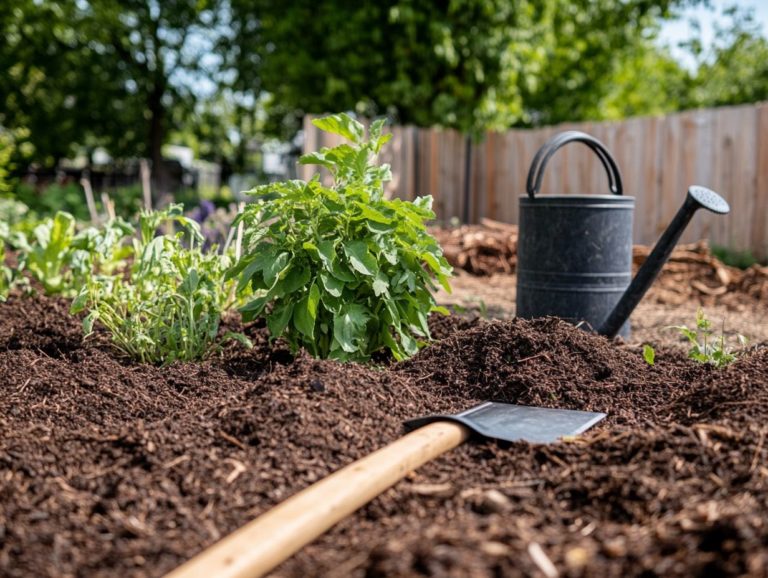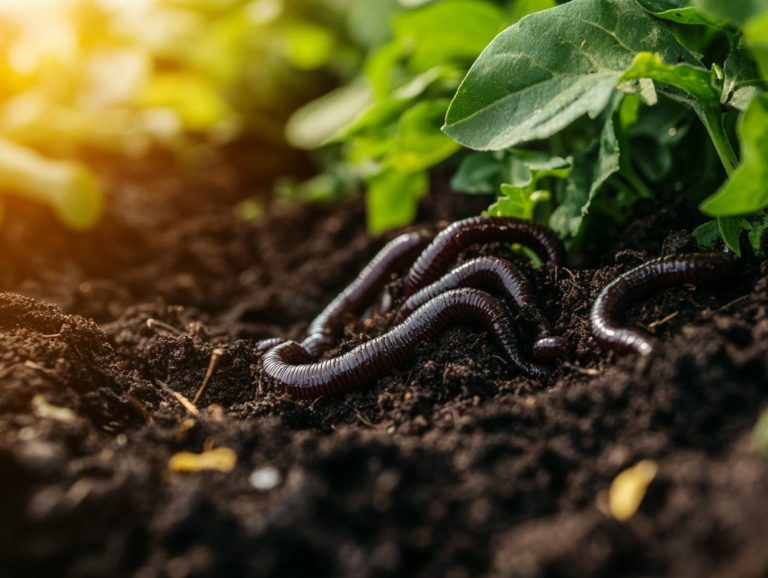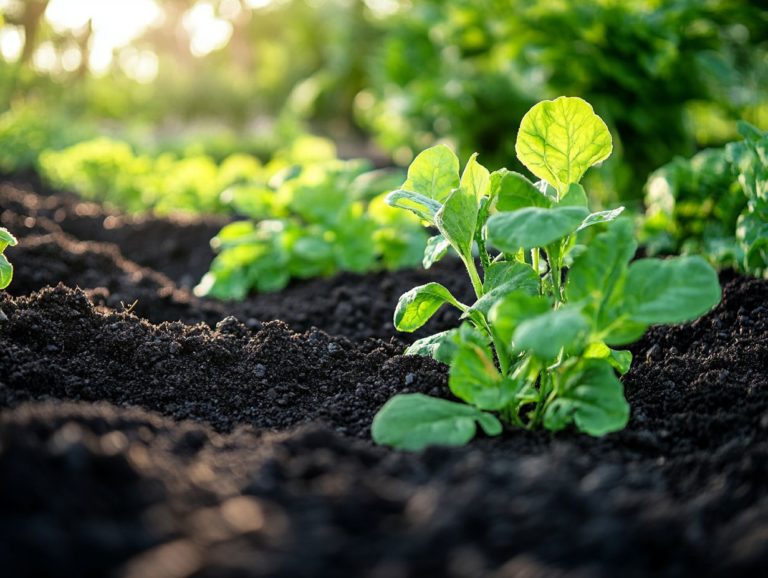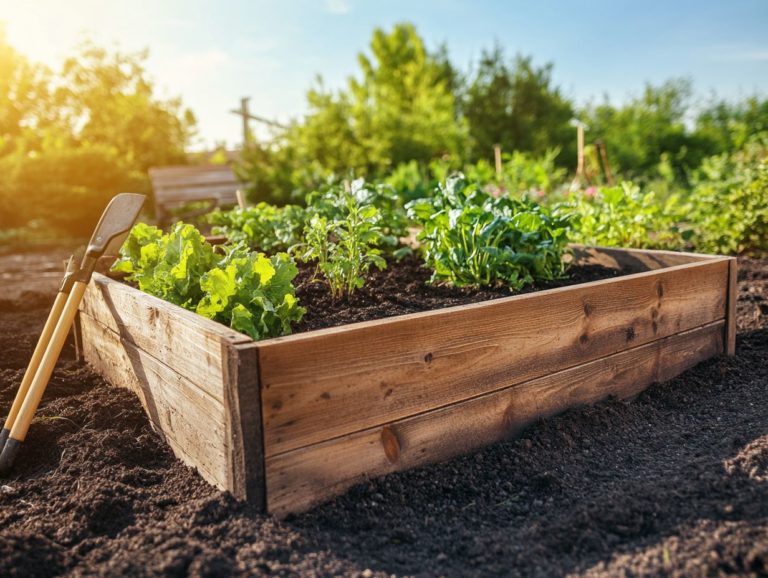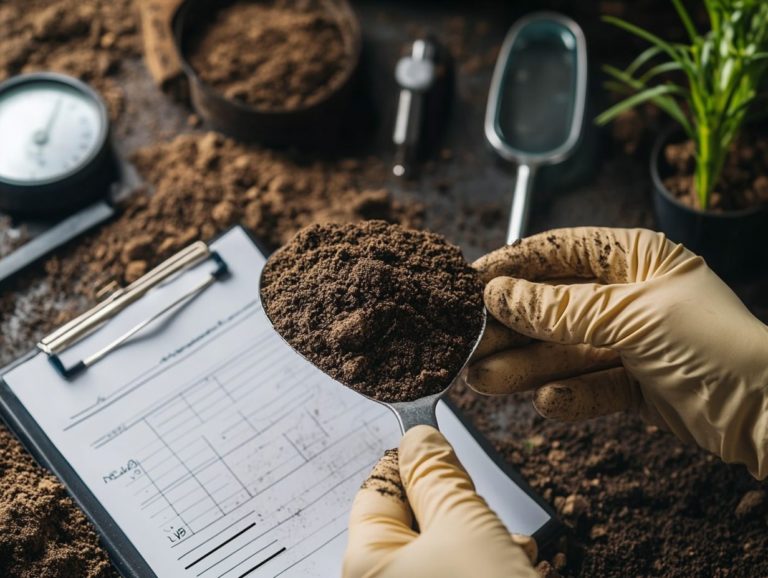5 Essential Tools for Soil Management
Understanding your soil is pivotal to achieving success in gardening and farming. Equipped with the right tools, you can enhance soil health, optimize plant growth, and ultimately realize greater yields. Get ready to transform your gardening experience!
This article delves into five essential tools for effective soil management:
- Soil testing kits
- pH meters
- Moisture meters
- Soil thermometers
- Soil amendments
Each of these tools serves a vital function in revealing the condition and requirements of your soil. Discover how to select the ideal instruments and methods to cultivate your garden with excellence.
Contents
Key Takeaways:

- Soil testing kits help determine the health and nutrient levels of your soil.
- pH meters aid in maintaining the correct pH balance for optimal plant growth.
- Moisture meters assist in monitoring soil moisture levels for proper hydration of plants.
1. Soil Testing Kits
Soil testing kits are essential tools for you, whether you’re a farmer or a passionate gardener. They provide critical insights into soil health, nutrient levels, and organic matter content.
This knowledge is vital for effective soil management and sustainable agricultural practices. By utilizing these kits, you can accurately assess the pH balance and pinpoint nutrient deficiencies in your soil.
You can also detect toxicity levels. This knowledge enables you to make informed decisions about fertilization and crop rotation.
With a variety of soil testing kits available, you can choose between DIY options for home use or more advanced laboratory kits that offer thorough analysis.
These kits function through chemical reactions or electronic sensors, allowing you to identify your soil’s current nutrient status. You can also monitor the flow of essential elements like nitrogen and phosphorus.
This proactive approach enhances nutrient movement and encourages the maintenance of organic matter, ultimately leading to healthier plants and improved yields.
2. pH Meters
pH meters are essential tools for assessing the acidity or alkalinity of your soil. This directly influences nutrient availability and the overall health of your soil.
Recognizing the optimal pH range for your specific crops is crucial since it impacts the solubility of key nutrients like nitrogen, phosphorus, and potassium. When soil pH drifts too high or too low, nutrient uptake can be significantly hindered, resulting in poor plant growth.
Beneficial microorganisms also depend on pH levels, as they are vital for maintaining soil structure and promoting nutrient cycling. To make the most of your pH meters, it’s important to calibrate them regularly.
Also, take measurements from multiple locations within your field to account for variability. Properly interpreting the results allows you to make tailored amendments, ultimately fostering a healthier soil ecosystem.
3. Moisture Meters
Moisture meters are essential tools for gauging soil moisture levels. They enable you to distribute irrigation effectively and ensure that crops absorb water optimally.
These cutting-edge devices measure the electrical resistance within the soil, which directly correlates with its moisture content. By providing real-time data, moisture meters enable you to make informed decisions, significantly reducing water wastage.
This practice not only conserves valuable resources but also enhances crop yield and improves soil structure. To maximize the benefits of moisture meters, consider these best practices:
- Regularly calibrate the device
- Check moisture at various soil depths
- Record readings over time to identify trends
Implementing these strategies can lead to healthier soil and more sustainable agricultural practices, benefiting both your crops and the environment. Act now to ensure your plants thrive!
Start using these tools today and watch your garden flourish!
4. Soil Thermometers
Soil thermometers play a crucial role in assessing soil temperature. This factor significantly influences microbial activity, soil health, and the timing of planting for optimal crop growth.
By understanding these dynamics, you can tailor your farming practices to better meet the needs of your crops. Monitoring soil temperatures allows you to predict periods of active microbial growth, which is essential for nutrient cycling and the decomposition of organic matter.
With the help of soil thermometers, you can pinpoint the best times for planting. This ensures that your crops are sown under the most favorable conditions for robust root development and overall vigor. Don t miss the opportunity to boost your crop yields!
This thoughtful approach not only enhances your crop yields but also fosters a healthier agricultural landscape. It minimizes the need for chemical interventions and promotes sustainability.
5. Soil Amendments

Soil amendments, like compost and mulch, are essential for enhancing soil health. They increase organic matter, improve nutrient storage, and promote a variety of life in the soil.
Consider using amendments like granular fertilizers and biochar. These materials offer controlled nutrient release, effectively feeding your crops. Introducing cover crops can also be a game-changer; their root systems anchor the soil, preventing erosion and protecting the land from degradation.
Each type of amendment plays a unique role, contributing to the delicate balance needed for sustainable agricultural practices. Learn about the benefits of each amendment to make choices that will boost your soil health!
How to Choose the Right Tools for Your Soil Management Needs?
Choosing the right tools for soil management requires a deep understanding of your soil’s unique characteristics. This knowledge is essential for fostering soil health and implementing effective water management practices in sustainable agriculture.
By evaluating factors such as pH, nutrient levels, and moisture content, you can identify the specific tools necessary for optimal soil care. Soil testing kits offer invaluable insights into nutrient deficiencies or toxicities, enabling you to make informed decisions about amendments.
Meters are equally important, as they measure moisture levels. This guides you in developing the best irrigation strategies to prevent erosion.
Incorporating amendments like organic matter or fertilizers not only boosts nutrient availability but also cultivates a resilient ecosystem. Selecting the right combination of tools will assist in controlling erosion and ensure the long-term productivity of your soil.
What Are the Different Types of Soil Testing Kits?
You ll find a range of soil testing kits available, each designed to assess various soil nutrients, organic matter levels, and pH levels. This information is essential for making informed decisions about soil management.
These kits typically fall into two categories: basic test kits offer quick measurements of pH and major nutrient levels, while advanced kits provide comprehensive analysis, including micronutrient content and soil texture.
Understanding pH is vital because it impacts nutrient availability. For example, acidic soils can restrict nutrient uptake in plants, while alkaline soils may lead to nutrient deficiencies.
Some kits even measure organic matter, allowing you to enhance soil structure and improve water retention. By utilizing these tools and exploring techniques for soil fertility testing, you’re well on your way to optimizing soil health, ensuring a balanced ecosystem that supports effective nutrient cycling and sustainable crop growth.
Unlocking the Secrets: Why pH Meters Are Game Changers for Your Soil!
Using pH meters offers a wealth of benefits, including accurate soil health assessment, better access to nutrients for your crops, and a deeper understanding of microbial activity within the soil ecosystem.
These devices allow you to measure the acidity or alkalinity of your soil, which directly impacts plant growth. Achieving a balanced pH translates to optimal nutrient uptake, fostering healthier plants. If your soil becomes too acidic or alkaline, certain nutrients may become locked away, hindering crop performance.
To manage your soil effectively, check pH levels regularly and interpret those readings accurately. A pH reading between 6 and 7 is generally ideal for most crops, while levels outside this range may require amendments like lime or sulfur to correct imbalances and promote robust growth.
How Moisture Meters Can Transform Your Soil Management!
Moisture meters are essential tools that provide crucial insights into soil moisture levels, enhancing water absorption and optimizing irrigation distribution.
These devices help you whether you’re a farmer or a gardener make informed decisions. By monitoring moisture levels at different soil depths, you can determine exactly when your plants need water and when they re adequately hydrated, effectively preventing both overwatering and underwatering.
This approach boosts the soil’s water retention capacity and minimizes the risk of runoff, which can lead to water pollution. With targeted irrigation practices guided by moisture meter readings, you can foster healthier plant growth while protecting local water resources.
Why Soil Thermometers Are Your Best Friends in Gardening!

As a gardener, you ll find soil thermometers are invaluable. They allow you to monitor soil temperature and understand how it affects microbial activity and plant growth. This knowledge fosters better gardening practices, enhancing soil structure and promoting a healthy ecosystem.
By keeping tabs on soil temperature, you can nurture a thriving ecosystem in your garden. The right temperature optimizes plant growth and boosts the activity of beneficial soil microbes. These vital organisms break down organic matter and improve nutrient availability, directly influencing your plants’ health.
Use a soil thermometer now to ensure your plants thrive! This tool helps you determine the perfect timing for planting or watering, ensuring conditions are just right. Since ideal soil temperatures vary for different plants, your attentiveness can lead to a more bountiful harvest and a healthier garden overall.
Ready to boost your garden’s health? Start using these tools today!
What Are Some Common Soil Amendments and Their Uses?
Common soil amendments like compost, peat moss, and green manure have many benefits. They improve organic matter and help nutrients move through the soil.
These amendments make soil structure better. This leads to increased water absorption and retention.
Compost enriches the soil with nutrients and boosts microbial activity. Peat moss helps retain moisture and prevents soil compaction.
Green manure adds nitrogen back to the soil as it breaks down, enhancing soil fertility.
All these amendments support a healthy ecosystem that is vital for plant growth.
Frequently Asked Questions
What are the 5 essential tools for soil management?
The essential tools for soil management are a shovel, rake, hoe, trowel, and watering can. By utilizing these tools effectively, along with the 5 tools for effective soil fertility management, you can achieve better soil health.
Why is a shovel important for soil management?
A shovel is key for digging, turning, and moving soil. This is crucial for storing nutrients and improving soil structure.
What is the purpose of a rake in soil management?
A rake levels soil, removes debris, and smooths surfaces for planting. This enhances air quality and promotes healthy vegetation.
How does a hoe assist in soil management?
A hoe breaks up compacted soil and removes weeds. It also creates planting trenches, improving water flow and supporting deep root growth.
What can a trowel be used for in soil management?
A trowel is perfect for planting small plants and removing weeds in tight spaces. It plays a vital role in maintaining plant diversity.
Why is a watering can necessary for soil management?
A watering can is essential for delivering water directly to plant roots. This promotes healthy growth and keeps the soil properly hydrated.
Using a watering can helps achieve effective watering for your plants. It ensures they thrive and the ecosystem remains balanced.

